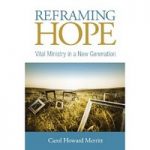Merritt, Carol Howard. Reframing Hope: Vital Ministry in a New Generation. Alban Institute, 2010. ISBN: 9781566993944.
Carol Howard Merritt is an ordained Presbyterian Church, USA pastor. She has served congregations in Louisiana and Rhode Island. Currently she serves Western Presbyterian Church – an intergenerational church in Washington D.C. Merritt is the author of Tribal Church: Ministering to the Missing Generation (2007) and Reframing Hope: Vital Ministry for a New Generation (2010). Merritt is the co-host of God Complex Radio and a contributor to the Huffington Post and the Presbyterian Outlook. To connect with her, like her on facebook, follow her on twitter, and/or read her blog.
Book Basics
Reframing Hope seeks to reframe the present situation in order to construct faithful and effective ministry today and the possibility for a brighter tomorrow. While many postmodern Gen-X pastors fluent in social media strive to move beyond their denominational heritage, Merritt writes as one who has chosen to stay and even refers to herself as a “loyal radical”. She offers multiple comparisons of then (ministry at the peak of mainline membership and influence) and now to help readers of all generations grasp the significance of the shift. Rather than starting with deconstructing what was, she begins by constructing what is and should be with a pastoral blend of personal experiences viewed alongside those of the church throughout the ages and colored by hope. Sandwiched between her introduction, “What is the Substance of our Hope,” and conclusion, “Hope in the Desert,” she offers seven hope-filled creative chapters: redistributing authority, re-forming community, reexamining the medium, retelling the message, reinventing activism, renewing creation, and retraditioning spirituality.
brighter tomorrow. While many postmodern Gen-X pastors fluent in social media strive to move beyond their denominational heritage, Merritt writes as one who has chosen to stay and even refers to herself as a “loyal radical”. She offers multiple comparisons of then (ministry at the peak of mainline membership and influence) and now to help readers of all generations grasp the significance of the shift. Rather than starting with deconstructing what was, she begins by constructing what is and should be with a pastoral blend of personal experiences viewed alongside those of the church throughout the ages and colored by hope. Sandwiched between her introduction, “What is the Substance of our Hope,” and conclusion, “Hope in the Desert,” she offers seven hope-filled creative chapters: redistributing authority, re-forming community, reexamining the medium, retelling the message, reinventing activism, renewing creation, and retraditioning spirituality.
So What?
Everyone agrees that the mainline church has been declining for decades in membership, income, and influence. Few have sought to reconstruct ministry in such a way as to restore a healthy role for denominational traditions. Merritt introduces a way forward that is less radical than it may first appear, but one that still requires changes that older generations may find troubling. In short, the church must do a better job of being the church in a way that connects with a postmodern people.
- What have you done to become more generationally aware?
- What “re-constructing” has been most helpful for you over the last several years?
- How could your denomination benefit from a more comprehensive struggle with the world as it truly is? How can you be an advocate for this type of re-thinking at every level of the church beginning in your own congregation?
In my opinion, her strongest chapter is on re-forming community. Consider the following three quotes from that chapter:
- “A new generation is longing for authentic community, a place that nurtures our spiritual lives and develops deep concern for one another. We look for groups that understand the need for both individual responsibility and communal action” (p.34).
- “Even as denominational churches continue to mourn their membership decline, a new generation of Christians is longing for the very practices of inclusion, diversity, and questioning that many mainline churches have been cultivating for these last few decades” (p.37-38).
- “We are reframing leadership and community, moving from competition to sharing, from the pyramid to the network, from creeds to conversations. We can welcome the innovation of a new generation by encouraging and supporting new communities and by welcoming them into our traditional congregations” (p.45)
Do you hear these words more as challenge or comfort? How can you help continue the conversation about re-forming Christian community?
For Further Reading:
Click here to read my review of Merritt’s previous book: Tribal Church: Ministering to the Missing Generation (2007).
Click here to read my review of Gerald Schlabach’s Unlearning Protestantism: Sustaining Christian Community in an Unstable Age, which also favors stability over the more common Protestant splits and allows room for “loyal dissent” by those like Merritt who have the good of the tradition in mind.
Click here to read my review of Clyde Steckel’s New Ecclesiology & Polity, which also sees the possibility of healthy future for mainline denominations if appropriate reform is made to adapt to the postmodern world.
